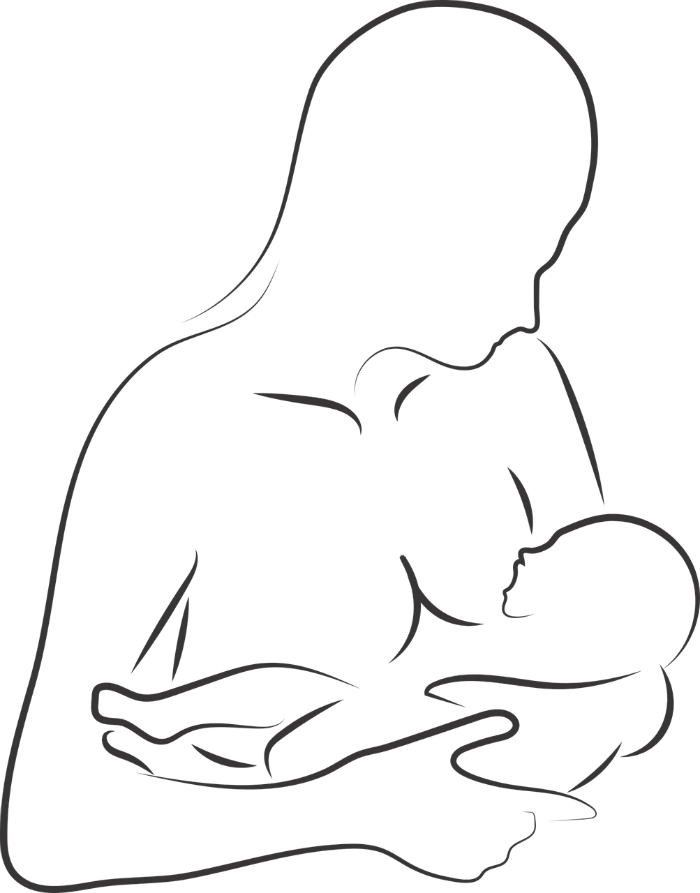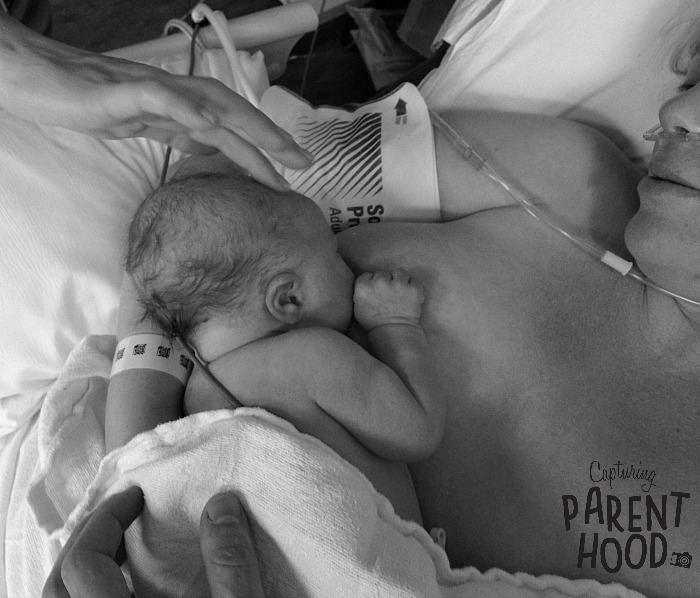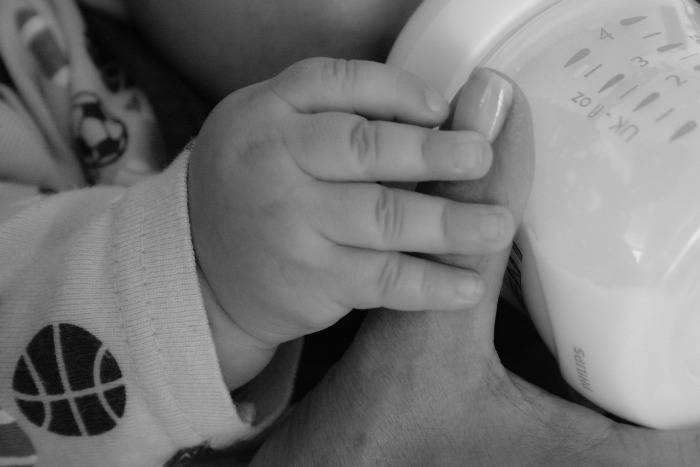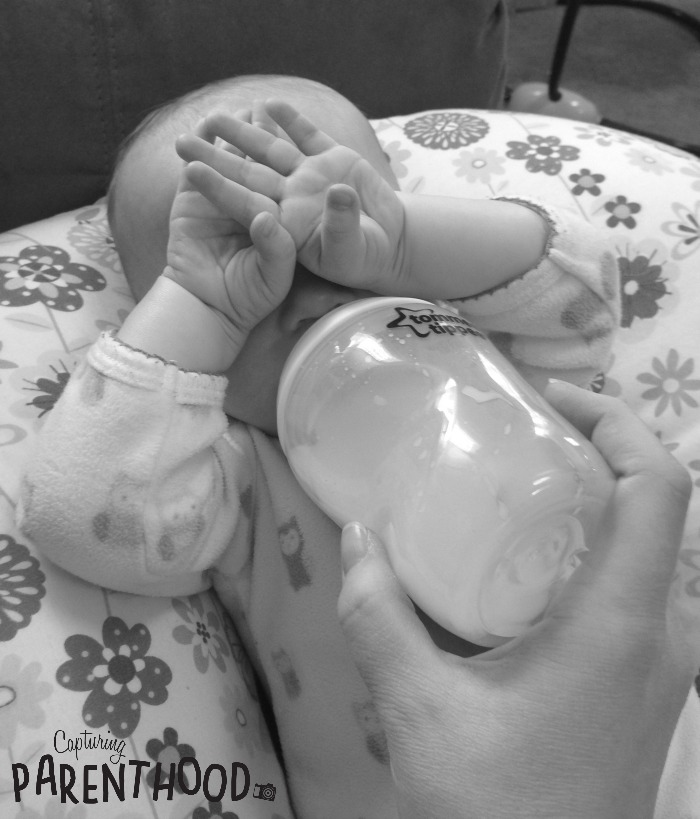Happy New Year! One of my goals for 2019 is to share a few more personal parenting anecdotes on the blog. So…I figured why not kick-start New Year’s Day by sharing one of my most personal posts yet? I’ve debated about sharing on this topic for quite some time now. I’ve honestly been a bit nervous, because breastfeeding is such a hot-button issue. It’s a stage of parenthood where people have developed seriously strong opinions. It’s a stage of parenthood that personally weighed me down with an immense amount of pressure and guilt, after giving birth to our daughter over four years ago. My breastfeeding battle caused me tons of stress and anxiety, and left me feeling completely inadequate and defeated. These extremely difficult feelings, that I struggled through as a first-time mom, are the #1 reason why I’ve ultimately decided to share my breastfeeding journey. If even one expectant parent reads this post and walks away with more realistic expectations of the breastfeeding experience (and how normal the difficulty is for the majority of mothers), it will be worthwhile.

To begin, I would just like to say that I am fully aware of the numerous benefits of breastfeeding (for both mother and child) and I agree that breastfeeding is extremely beneficial. That being said, we are all different, and we all have different experiences. I respect everyone’s opinion and experience, and I’m kindly asking you to show me the same courtesy. If reading this post leaves you with strong negative feelings, or you think you might have the answers to my breastfeeding dilemmas, or you just want to tell me that I didn’t try hard enough…I’m asking you to please refrain from leaving any negative or judgmental comments.
I wholeheartedly feel that we should be understanding and supportive of all mothers in their breastfeeding journeys (or lack thereof). I think we should all be able to share our breastfeeding experiences (should we so choose) so that new parents have a wealth of information, and will realize that the journey is vastly different for everyone, and that it’s not often an easy road. I wish I had known more about the common difficulties with breastfeeding that most new moms face. I wish that I had not felt so alone. I wish that I had realized sooner that the best thing that I could do for my baby, was to take care of myself, and not put undue stress on my mind, body, and soul.
I was well aware of the Breast is Best motto even before I became pregnant. Early on during my pregnancy, I read more about the importance of breastfeeding an infant. Not only does breast milk contain the perfect mix of vitamins, protein, and fat that a newborn requires, it also contains antibodies that help a baby fight off bacteria and viruses. Breast milk magically boosts a baby’s immunity. And as a new parent, you want nothing more than a healthy baby. I decided early on that I was going to breastfeed our baby for at least 6 months (hopefully a full year). And that was that. I made my decision and then I didn’t bat an eye at the topic for the remainder of my pregnancy – aside from picking out a breast pump (since I would be returning to work after 12 weeks of maternity leave). In all honesty, I just assumed that breastfeeding would come naturally. I knew it might take some getting used to, or that we might need a little help with getting the proper latch. But I never in a million years imagined that my body would fail to produce enough milk to feed my child.

After our daughter was delivered (via c-section – which you can read all about in her birth story) we thought everything was going swimmingly. They wheeled us into a post-op room and our little girl latched right on and started eating. Easy peasy. She remained like that for over an hour. Our post-op nurse was so impressed. With her praise, I felt like a breastfeeding champion in that moment. Unfortunately, that moment didn’t last. After incredibly lengthy feedings throughout the night, our pediatrician arrived to check on our new bundle of joy…only to discover that our baby had lost a significant amount of weight already. She was not getting enough to eat, despite the fact that she was latched to my breasts most of the time. I was immediately defeated and confused. I only wanted what was best for my daughter, and I was heartbroken that I was failing to give that to her. How could she not be getting enough – she was eating all the time? But that was just it…she was constantly latched to my breasts because she was starving and she wasn’t getting enough to eat. It certainly explained her disinterest in sleep, as well as her frustrated and grumpy demeanor.
The doctor informed us that we would need to supplement…at least until my milk supply finally came in. Luckily, the hospital acquires breast milk from a local certified milk bank for such occasions. They provided breast milk in a little bag that then ran down a tiny tube that was taped to my breast (so that the end of the tube rested directly next to my nipple). This way, our daughter could still breastfeed, while also getting the additional milk that she needed. But if you thought getting a newborn to latch onto a breast was hard…try getting a perfect latch while also making sure that an extra tube ends up in their mouth at the same time. While I appreciated that our daughter was getting the nutrients that she desperately needed to grow, this supplementing method had me completely frazzled, frustrated, and distraught. My feelings toward breastfeeding were souring by the second.
Not only did I have to fight to get a plastic tube and nipple into our daughter’s mouth during every feeding, but I also had to hook myself up to a breast pump after every single feeding. This was recommended in order to boost my milk supply. Needless to say, it felt like there was something attached to my breasts every single second of the day. I was unhappy. I felt like I was failing my daughter (and my husband). I felt like there was no time for me to just cuddle and love on my little girl. I was a food factory – and a terrible one at that – my milk production was abysmal. I’ve heard all the stories of the special mother/baby bonding time that breastfeeding provides…but that goes right out the window when you are wrestling with an extra feeding tube and your mind is filled with worry over your baby’s health and weight.
I struggled through those first few days in the hospital, recovering from major surgery and desperately trying to feed my daughter. With the supplementing, she started to gain weight and we got to go home (with one extra bag of donated breast milk and feeding tubes). It was also recommended that we rent a hospital-grade breast pump since the one we had purchased wouldn’t be effective enough at increasing my milk supply. Who knew that you could rent breast pumps from Walgreens? Affordably, no less? I wish I had known that little tidbit before I ever purchased a pump off of Amazon. Although, the hospital-grade pumps are much larger/bulkier for carrying into the workplace.
So that was that, we unpacked and setup camp in our living room (so that I could avoid the stairs, as recommended). And I continued my breastfeeding ritual – strap on a feeding tube and feed my little nugget (30 minutes on each breast) and then hook myself up to the breast pump for another session (only to gather an ounce or two). Then I had to clean all the pump supplies…before turning around and starting back over again. In the few spare minutes I had, I would ingest every natural milk production supplement and tea known to man.

We quickly used up the donated breast milk. Unfortunately, the milk bank only provides breast milk to local hospitals, as well as mothers who are completely unable to breastfeed (not those who are struggling with milk production). Therefore, my goal was to use the extra I was getting from pumping to supplement, but it didn’t take long to realize that I still wasn’t producing enough milk to keep our baby girl fed…so we bucked up and bought some formula. It obviously was not part of our plan and I wrestled with the decision – knowing how important breast milk is for babies. But we no longer had a choice…our daughter needed to eat…and she was in fact still getting breast milk (just not exclusively).
My frustrations and despair over my breastfeeding battle continued. I think it only took about two days at home before I yanked the feeding tube off my breast and chucked it across the room. I was tired of constantly struggling with it. With the tube gone, our routine changed. I would breastfeed on each side, before giving our daughter a bottle of pumped breast milk (or formula, when necessary) while I pumped. And around and around we went.
After a few weeks of constant feeding and pumping, my milk supply had not increased one bit. And I was feeling every emotion – but mostly anguish and anger over my lack of milk production. That’s when I decided to schedule a consultation with a lactation specialist at the hospital where I gave birth. When we arrived, they weighed our little nugget. After breastfeeding her, she was weighed again, to see how much milk she had received. The numbers were soul-crushing. Our lactation consultant then had me pump for 20 minutes. Her utter shock at the lack of milk I produced said it all. Once her astonishment wore off, she launched directly into a gazillion theories as to why my milk production was so low. Sometimes women who give birth via c-section have a harder time producing milk (or it takes longer to come in). It could be genetic – had my mother breastfed? I actually had to call my mom on the spot to answer that question – I had no idea. I discovered that my mom also had difficulty breastfeeding my older brother and ended up using formula. And it was formula for me from the get-go. While it was nice to hear that someone else had struggled with milk production, it didn’t really make me feel any better. The lactation consultant went on and on…it could be because my breasts are farther apart – apparently studies have shown links with the distance between breasts and milk production. I was beside myself, and left the consultation feeling completely defeated. I had gone in for help, for suggestions, for reassurance, for motivation – but all she gave me where a bunch of crazy (at least to me) excuses for why I was producing practically zero milk after weeks postpartum.

At this point, I was so ready to give up…but I desperately wanted our daughter to get the breast milk she needed. So I continued on, but our breastfeeding routine changed yet again. I just couldn’t keep up with the constant cycle of breastfeeding, pumping, and cleaning all the supplies for the next round (all while caring for a newborn). Completely exhausted and emotionally-drained, I eventually decided to pump exclusively. It was not a decision that I made lightly, but it was a necessary decision for me (personally) to make. I no longer had to spend all of my time operating as a food factory, and I was finally able to spend some quality time with my daughter that did not revolve around feedings.
With a bit of the breastfeeding stress off my shoulders, I started to feel more positive. If I could keep up the pumping routine, maybe (just maybe) my milk production would finally increase. But everyday it was the same thing – significantly low amounts of breast milk. My breastfeeding (or pumping, at this point) battle raged on until I was just a shell of a human being. I was completely drained – both physically and emotionally. And I still felt like a failure.
At my lowest, I finally heard my husband’s pleas and reassurances. Our little girl was healthy and thriving…and I was missing it, because of the breastfeeding burden I was placing on myself. While he appreciated all of my efforts to feed our baby, he knew that we would all be better off if our breastfeeding journey came to an end sooner than we had planned.
My difficulties and insecurities about breastfeeding definitely made the start of my parenting journey harder than necessary. It put a strain on every relationship in the house. I’m forever grateful that my husband recognized my unnecessary struggle and gently informed me that our little nugget would be just fine if she was given formula, and that my lack of milk production didn’t make me a bad mother. The sheer amount of effort that I was putting into the process, and the fact that I was completely willing to deplete myself just to breastfeed our child, meant that I obviously cared very deeply. He reminded me that I was not doing anyone any favors by running myself into the ground. And he was right…as soon as I let go of the expectations, a huge weight was lifted. I was happier, more engaged and in-tune with our daughter, and able to more fully enjoy and appreciate the new addition to our family.
I did not stop pumping cold turkey. I had already experienced the pain of blocked ducts while breastfeeding, and I didn’t want to create any more complications for myself. So I slowly scaled my pumping sessions down over the course of two weeks – and it went smoothly. As each day passed, I gained more of my life back – which meant more time to spend with my beautiful baby girl.

When all was said and done, our daughter received breast milk (supplemented with formula) for the first 3 months of her life. It’s not the duration that I had initially planned or hoped for, but it’s better than nothing…and for that, I’m grateful.
So, for the new moms out there (or newly expecting) – just know that breastfeeding can come with a wealth of difficulties and complications. The process may not go exactly as you planned (much like birth), but you will do your best. Breastfeeding is not easy for the vast majority of mothers. And if for some reason you cannot breastfeed your child, you are not a failure…it does not make you a bad mother. When it really comes down to it…Fed is Best.
And since I went into the whole breastfeeding thing quite blindly, I wanted to take a bit of time to share a few breastfeeding statistics with you. I think all we really hear about as expectant parents are the recommendations for breastfeeding. The American Academy of Pediatrics recommends exclusive breastfeeding for at least the first 6 months of life, continued with appropriate foods for 1 year, or longer. The World Health Organization follows the same 6-month guidelines, but extends their recommendation to 2+ years of age. And while breastfeeding rates continue to increase, the percentage of women who actually fulfill the recommended timelines was somewhat shocking to me.
The Centers for Disease Control and Prevention (CDC) report that approximately 60% of mothers don’t breastfeed for as long as they intend. The CDC’s current breastfeeding data spans from 2009 to 2015. And just to share a snippet – here are the numbers for 2014:
- 82.5% of US children were breastfed at least once
- 55.3% of US children were breastfed to 6-months of age (24.9% exclusively)
- 33.7% of US children were breastfed to 12-months of age
It is also worthwhile to point out that breastfeeding rates can vary due to geography, socio-economic status, race and/or culture.
The World Health Organization reports that globally, only 40% of infants under 6-months of age are exclusively breastfed.
So while there is this notion out there (at least I thought there was when I was pregnant) that the vast majority of women breastfeed their children for the recommended periods of time…the actual data is vastly different. In reality, most mothers experience issues with breastfeeding. The most common of which include: lactation and latching, infant nutrition and weight, un-supportive work policies, cultural norms, and lack of family support.
While I highly recommend that mothers breastfeed their babies, I fully understand the difficulties that can prevent someone from breastfeeding their child for as long as anticipated. If those difficulties arise, just know that it’s ok. Everything will be ok. You are not alone. You have not failed anyone. Your health and happiness is vitally important in keeping your baby happy and healthy. If your baby is fed and receiving the proper nutrients required to grow and thrive, then you’re doing a spectacular job!




